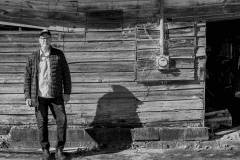New bands with new music can sometimes be like handling a tricky ex; you never know if when you cross paths they’re either harboring psychotic ill will or maintain a friendly disposition. Either way, you question their appearance, and you have to decide if you’re going to stick around or just walk away at a frantic pace. Maybe it’s just you and you’re overthinking things in a third-party mindset. In any case, Toronto’s Sham Family delivers its self-titled EP and debut (Wavy Haze Records). We have four tracks the quartet maneuvers through a hodgepodge of styles, to create one of the band’s own. The group shifts through thick mechanical rhythms, guitar distorted melodies & lingering feedback, with spoken word-like vocal deliveries.
The band’s influences are clear but Sham Family isn’t a carbon copy of anything or anyone as songs cruise and glide effortlessly, one right after the other. “This Blue Mob” is clearly the attention grabber, and probably the one many will defer back to but it isn’t the only thing the band has cultivated here. “Plaque Protection” is a bit airy with an infectious melody and gooey bassline to grab ahold of. Guitars accentuate the track as the chorus of “Don’t be sucker / It’s plaque protection laid on thicker / Don’t be a sucker / It’s class protection for the richer.” Listeners may lose the band’s message, but they should be forced to pay attention to its dissent. The band doesn’t hide its melodies within the distortion, and “Lasso” is a repetitive beast that you just can’t get enough of. It’s majestic up until it’s ultimate conclusion while the closing “Splitting Image” contains an induced fervor of pop sensibilities strewn throughout it. More than halfway through the song, the band plays with improvisation and experiments within the track’s melody. Instruments collide and crash against one another, allowing listeners a further look inside the Sham Family practice. The rhythms are steady though and this closing is welcomed.
It’s clear the Sham Family knows exactly what it’s doing, and doing it well. Once everyone hears this, it’s clear that big things are to follow.
Facebook | Twitter | Instagram
From one album to the next, Japan’s Boris has shifted its take on music from one album to the next. But this isn’t something new for a group who in its 30-year existence has managed to weather the test of time through constant evolution in its sound, regardless of whichever form it may take. But if you were searching for the sonic oblivion of 2020’s NO, you may need to look in a different direction altogether. The group’s new release W (Sacred Bones Records) follows a slightly similar path as 2019’s Love & Evol where the band touched on softer moments, as the band opts for much more experimentation, to capture the opposite side of its musical coin. W is Boris’ 27th studio album, and that doesn’t include the collaborative releases with Merzbow, Keiji Haino, and the like. The band has suggested that NO and W are weaved together to form ‘NOW’ which offers up a complete picture of the group’s sound.
On the new album, Boris intertwines delicate movements, twisting instruments to do its bidding. There are slow-building melodies strewn throughout and taking “Icelina” as an example of the band’s prowess, it combines an innocent and seraphic vocal delivery to an otherworldly musical backdrop. It offers layers of atmospherics, controlled electronics into one rapturous track. While this might be the epitome of the album’s sound in a nutshell, there’s much more offered here as well. “Drowning By Numbers” coils together organic percussion with ethereal feedback manipulations unraveling into a controlled chaos. It’s brilliant within its movements. But it’s on “The Fallen” where no interpretation is needed; lilting vocals over an electric guitar melody as the soft percussion in the backdrop gently keep pace before an explosive dynamic shift majestically carries the band along. Simply, THIS!
The band plays with sonically diverse sounds on the instrumental “Beyond Good and Evil” which would challenge even MBV for the right of grandmaster guitar manipulator, but this is no surprise as Boris has honed its skill for decades. Even with “You Will Know (Ohayo Version)” the band plays with both its harder-edged side and seamlessly blends it with its more adventurous. Boris is relentless. There isn’t any other band that could possibly match the ferocity of Boris or even
Facebook | Twitter | Instagram
There are a number of artists that evoke emotions the way no one else has the ability to. And there are bands that can haunt dreams with clear and concise imagery. As the number may seem to grow, there aren’t many that have the capability to convey both at once though. It may be difficult for some to imagine Pedro The Lion, fronted by David Bazan, has only released a handful of albums in its over 25-year existence. The band’s amicable demise did come in 2004 and Bazan began filling his time with a myriad of projects before reconvening for 2019’s Phoenix. There was the one-off release of Headphones (with T.W. Walsh and Frank Lenz), Overseas (with Will Johnson, Bubba & Matt Kadane), Lo Tom (with Trey Many, T.W. Walsh, and Jason Martin), as well as releasing music under his own name as a solo artist. But Pedro has always been a different beast altogether.
This week Bazan’s Pedro The Lion released its newest Havasu (Polyvinyl Records) which keeps to his self-reflective youth Phoenix touched on, seems to singularly move through its Pedro-induced aesthetic. The band opens with “Don’t Wanna Move” a descriptive detail of Bazan’s trek to a new place with his family, to a city he ached not to be in. he winds his lyrical wordplay around musical landscapes that offer clarity, as sparse instrumentation eases and eventually morph with density but never relinquishing the scantily clad instrumental backdrop. Throughout the album, clips of Bazan’s youth are on full display, kike on “Too Much” where he addresses childhood awkwardness, the new kid in school holding tightly to “too much desperation for a casual conversation.” Guitar notes caress his vocals as the rhythm section steady allows for crescendos and slight dynamic shifts. But it’s “First Drum Set” that paints a picture with lyrics that we’re able to learn much about the multi-instrumentalist. In his youth, shifting instruments at a young age, pleasing the patriarchy, learning a variety of devices that held no interest for him. The music set here shifts from a sorrowful melancholy to powerfully cheerful; it matches in energy what Bazan’s words hold with gaiety. One life is finally traded for another. Here we see all aspects of what Bazan can offer with Pedro The Lion, and it’s everything we want. This is only the beginning.
Throughout the album, Bazan offers a wide array of accounts through his own narrative. With “Teenage Sequencer” Bazan ignores any teenage angst, instead, allured by the thought of teenage love. Even spurned, it returns to him in one fashion or another while regret lingers for him, but for others. It continues with “Own Valentine,” filled with youthful heartbreak while receiving redemption from another. And it’s easy to fall in love with Bazan’s words moving along to the simmering flow of the music, with just a few notes leading the way. The music moves into haunting sadness around “Making The Most Of It” while allowing for delightful choruses within the simplicity of the song. Pedro The Lion compositions haven’t always had a requirement for an abundance of notes, chord, or progression changes, instead, opting for harmonies & melody shifts. On “Old Wisdom” Bazan, which is beautifully structured, he utilizes faith & God in his lyrics from a child-like perspective, overthinking life & death. The melody incorporated through the song is magical, bending his vocal cadence to match its beauty. But “Stranger” is the moment that many could find relatable with visions of youthful loneliness. There’s subtlety in the music surrounding it, which seems to be layered with instruments around. It’s picture-perfect.
Lyrically, it seems Havasu is just one chapter of Bazan’s life, fitted within the musical aspects of Pedro The Lion. Songs are captivating without being forceful, surrounded by continual peace. It’s possible this is the album that could, or rather should go down as Pedro The Lion’s masterpiece.











Social Media